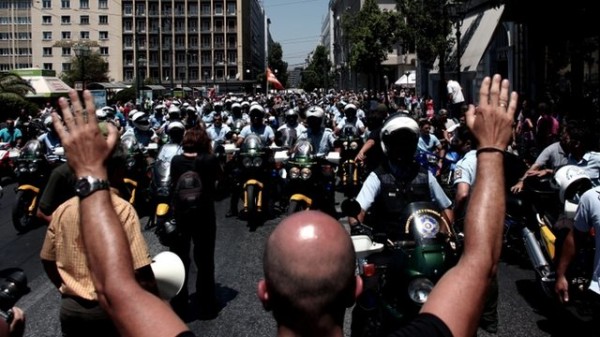Thousands of Greek workers are holding a 24-hour strike called by trade unions to protest against government plans to cut public sector jobs.
Hospital services, public transport and flights are being affected by the industrial action.
Demonstrations have been building for several days over the latest set of deeply unpopular austerity measures.
MPs plan to pass a bill this week to start receiving 6.8bn euros (£5.8bn) of bailout loans to keep Greece afloat.
Greece’s international creditors demanded the cuts to approve the latest batch of loans from its international bailout programme, as agreed earlier this month. They said Greece’s reform programme was moving too slowly.
Under the bill, which comes to a vote on Wednesday, more than 4,000 state employees, including teachers and local government workers, face dismissal this year.
In addition, 25,000 will be put into a “mobility pool” by the end of the year.
The employees will have an eight-month period on 75% of their salaries to be redeployed, by which point, if they are not transferred to another department, they will face redundancy.
It is thought up to 11,000 could lose their jobs by the end of 2014, to comply with the demands of the troika – the European Union, European Central Bank and International Monetary Fund.
Previous austerity measures have made cuts to salaries and pensions in the public sector.
‘Painful adjustment’
Greece has witnessed mounting protests over the cuts, with Tuesday’s strike – the fourth this year – disrupting flights, rail travel and hospital services.

Greece's fourth general strike this year has brought public transport to a halt.

Some 15,000 state employees will be affected by the latest round of austerity measures.
In Athens, several thousand trade union members and supporters held a rally in Syntagma Square – outside the parliament building. The demonstration was organised by the country’s biggest umbrella unions GSEE and ADEDY.
“You politicians, kowtowing to the troika, have raped our souls, destroyed our lives,” GSEE’s General Secretary Nikolaos Kioutsoukis was quoted as saying by the Associated Press news agency.
Protesters also took to the streets in the second largest city, Thessaloniki.
The unions say they will not give up without a fight, says the BBC’s Chris Morris in Athens says.
But the government says it now has no choice but to enforce further painful adjustment, he adds, in a country where unemployment is at record levels and the economy has shrunk dramatically since the bailout programme began.
“We are not opposed to reform. What we do oppose is abolishing entire institutions like the municipal police and personnel to guard state schools,” said Costas Askounis, leader of the protesting Central Union of Municipalities.

Thousands of workers rallied in front of Greek parliament in Athens to protest against the public sector cuts.

Unemployment is at an all-time high in Greece, with 27% of the population out of work.
Greece has an unemployment rate of 27% and public unrest has lead to political instability, and four different Greek governments in as many years.
The country has been dependent on loans from the European Union, the International Monetary Fund and the European Central Bank, since May 2010.
Earlier on Tuesday, MPs voted in favour of prosecuting former Finance Minister George Papaconstantinou over allegations that he tampered with a list of 2,000 suspected tax evaders. Mr Papaconstantinou has denied any wrongdoing.
Correspondents say tax evasion is a major problem in Greece and one of the main reasons for its financial crisis.




Leave a reply